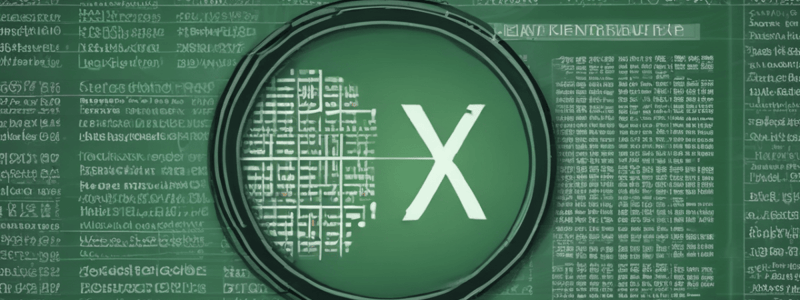Podcast
Questions and Answers
What is the formula to subtract the value in cell B1 from the value in cell A1?
What is the formula to subtract the value in cell B1 from the value in cell A1?
- =B1-A1
- =A1+B1
- =A1-B1 (correct)
- =A1*B1
Which shortcut jumps to the beginning of the worksheet?
Which shortcut jumps to the beginning of the worksheet?
- Ctrl + End
- Ctrl + Page Down
- Ctrl + Home (correct)
- Ctrl + Page Up
What is the formula to convert the text in cell A1 to uppercase?
What is the formula to convert the text in cell A1 to uppercase?
- =TITLE(A1)
- =PROPER(A1)
- =UPPER(A1) (correct)
- =LOWER(A1)
What is the purpose of the Ctrl + Z shortcut?
What is the purpose of the Ctrl + Z shortcut?
What is the formula to look up the value in cell A1 in a range and return the corresponding value in the second column?
What is the formula to look up the value in cell A1 in a range and return the corresponding value in the second column?
What is the purpose of the Ctrl + 1 shortcut?
What is the purpose of the Ctrl + 1 shortcut?
In which century did cricket originate in England?
In which century did cricket originate in England?
What is the main focus of defensive batting in cricket?
What is the main focus of defensive batting in cricket?
Who is responsible for enforcing the rules and making decisions on dismissals in a cricket match?
Who is responsible for enforcing the rules and making decisions on dismissals in a cricket match?
What is the term for a batsman being hit by the ball and knocked over?
What is the term for a batsman being hit by the ball and knocked over?
When did international cricket begin?
When did international cricket begin?
What is the primary role of an umpire in a cricket match?
What is the primary role of an umpire in a cricket match?
What is the main objective of bowling in cricket?
What is the main objective of bowling in cricket?
What is the term for a ball delivered at the batsman's feet?
What is the term for a ball delivered at the batsman's feet?
What is the role of the wicket-keeper in a cricket match?
What is the role of the wicket-keeper in a cricket match?
What is the signal used by an umpire to indicate a four?
What is the signal used by an umpire to indicate a four?
Flashcards are hidden until you start studying
Study Notes
Formulas
Arithmetic Operations
=A1+B1: Adds the values in cells A1 and B1=A1-B1: Subtracts the value in cell B1 from the value in cell A1=A1*B1: Multiplies the values in cells A1 and B1=A1/B1: Divides the value in cell A1 by the value in cell B1
Text Functions
=LOWER(A1): Converts the text in cell A1 to lowercase=UPPER(A1): Converts the text in cell A1 to uppercase=PROPER(A1): Converts the text in cell A1 to proper case
Logical Functions
=IF(A1>10,"Greater than 10","Less than or equal to 10"): Checks if the value in cell A1 is greater than 10 and returns a string accordingly
Lookup and Reference Functions
=VLOOKUP(A1, range, 2, FALSE): Looks up the value in cell A1 in the range and returns the corresponding value in the second column
Shortcuts
Navigation
Ctrl + Home: Jumps to the beginning of the worksheetCtrl + End: Jumps to the end of the worksheetCtrl + Page Up/Page Down: Move to the previous/next worksheet
Editing
Ctrl + C: Copies the selected cell(s)Ctrl + X: Cuts the selected cell(s)Ctrl + V: Pastes the copied or cut cell(s)Ctrl + Z: Undoes the last actionCtrl + A: Selects the entire worksheet
Formatting
Ctrl + 1: Applies the default number format to the selected cell(s)Ctrl + Shift + %: Applies a percentage format to the selected cell(s)Ctrl + Shift + ~: Applies a general number format to the selected cell(s)
Formulas
Arithmetic Operations
=A1+B1adds the values in cells A1 and B1=A1-B1subtracts the value in cell B1 from the value in cell A1=A1*B1multiplies the values in cells A1 and B1=A1/B1divides the value in cell A1 by the value in cell B1
Text Functions
=LOWER(A1)converts the text in cell A1 to lowercase=UPPER(A1)converts the text in cell A1 to uppercase=PROPER(A1)converts the text in cell A1 to proper case
Logical Functions
=IF(A1>10,"Greater than 10","Less than or equal to 10")checks if the value in cell A1 is greater than 10 and returns a string accordingly
Lookup and Reference Functions
=VLOOKUP(A1, range, 2, FALSE)looks up the value in cell A1 in the range and returns the corresponding value in the second column
Shortcuts
Navigation
Ctrl + Homejumps to the beginning of the worksheetCtrl + Endjumps to the end of the worksheetCtrl + Page Up/Page Downmoves to the previous/next worksheet
Editing
Ctrl + Ccopies the selected cell(s)Ctrl + Xcuts the selected cell(s)Ctrl + Vpastes the copied or cut cell(s)Ctrl + Zundoes the last actionCtrl + Aselects the entire worksheet
Formatting
Ctrl + 1applies the default number format to the selected cell(s)Ctrl + Shift + %applies a percentage format to the selected cell(s)Ctrl + Shift + ~applies a general number format to the selected cell(s)
Cricket History
- Cricket originated in England in the 16th century
- First recorded match in 1598, played by English schoolboys
- Marylebone Cricket Club (MCC) established in 1787, responsible for creating the first official rules
- International cricket began in 1844 with a match between the US and Canada
- First Test match played in 1877 between England and Australia
Batting
- Batsman's primary objective is to score runs by hitting the ball with a bat
- Ways a batsman can be dismissed:
- Bowled: hit by the ball and knocked over
- Lbw: hit by the ball and adjudged to be out by the umpire
- Caught: hit by the ball and caught by a fielder
- Run out: hit by the ball and run out by a fielder
- Stumped: hit by the ball and stumped by the wicket-keeper
- Types of batting styles:
- Defensive batting: focuses on protecting the wicket
- Aggressive batting: focuses on scoring runs quickly
- Technical batting: focuses on proper technique and footwork
Umpiring
- Umpires enforce the rules and make decisions on dismissals
- Key responsibilities:
- Counting the number of deliveries in an over
- Deciding on dismissals (e.g. bowled, lbw, caught)
- Monitoring the condition of the ball
- Enforcing rules regarding player behavior
- Umpires use various signals to communicate:
- Out: raised index finger
- Not out: shaking head
- Four: arm raised horizontally
- Six: arm raised vertically
Bowling
- Bowling involves delivering the ball towards the batsman
- Types of bowling:
- Fast bowling: focuses on speed and accuracy
- Spin bowling: focuses on turning the ball to deceive the batsman
- Medium bowling: combines speed and spin
- Bowling techniques:
- Overarm bowling: ball is delivered with the arm straight
- Underarm bowling: ball is delivered with the arm bent
- Round-arm bowling: ball is delivered with the arm at a 90-degree angle
- Bowling strategies:
- Yorker: ball is delivered at the batsman's feet
- Bouncer: ball is delivered short and rising
- Good length: ball is delivered at a length that makes it difficult for the batsman to play
Fielding
- Fielding involves stopping the ball and preventing runs
- Fielding positions:
- Wicket-keeper: stands behind the wicket and catches the ball
- Slip fielders: stand behind the wicket and catch the ball
- Gully fielder: stands between the wicket-keeper and slip fielders
- Point fielder: stands at an angle to the wicket
- Cover fielder: stands in front of the wicket
- Fielding techniques:
- Catching: fielders catch the ball to dismiss the batsman
- Stopping: fielders stop the ball to prevent runs
- Throwing: fielders throw the ball to the wicket-keeper to run out the batsman
Studying That Suits You
Use AI to generate personalized quizzes and flashcards to suit your learning preferences.




